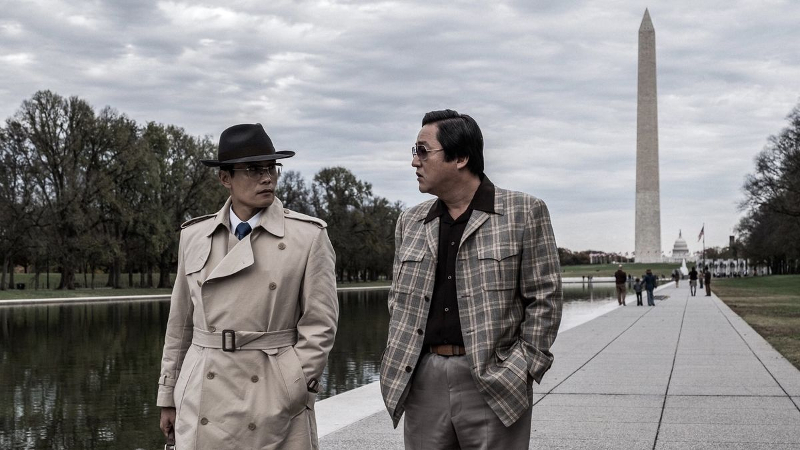Director – Woo Min-ho – 2020 – South Korea – Cert. 15 – 113m
****
The head of the Korean CIA becomes increasingly sidelined by President Park and decides to assassinate him – in Virtual Cinemas including Curzon Home Cinema from Friday, 25th June and on Digital Download from Monday, July 5th
Adapted from a novel, part historical truth, part guesswork and invented fiction, this is the story of Kim Gyu-Peong (Lee Byung-hun from The Fortress, Hwang Dong-hyuk, 2017; The Age Of Shadows, 2016; I Saw The Devil, 2010; The Good, The Bad And The Weird, 2008; A Bittersweet Life, 2005, all by Kim Jee-woon, and Joint Security Area, Park Chan-wook, 2000), the last director of the Korean Central Intelligence Agency (KCIA) under President Park Chung-hee ( Lee Sung-min from The Good, The Bad And The Weird, 2008) who was in power in South Korea between leading a coup and winning the subsequent elections in 1963 and his assassination by Kim in 1979. Confusingly, a second character bears the same surname as the President, Kim’s predecessor at the KCIA Park Yong-gak (Kwak Do-won from The Wailing, Na Hng-jin, 2016).
It starts off in 1979 with Kim entering the presidential safe house and vowing to the gate security detail that the president “dies tonight”. “When the nation goes haywire,” he says, “we all die.” Then he disappears behind a door and a gunshot is heard. All of which is a truncated version of the assassination scene in the closing minutes, so perhaps it was added at the start in the editing.

Next there’s some preamble detailing the history then we’re in Washington D.C. with former KCIA director Park testifying to an investigation about “the rottenness due to President Park”. Ex-director Park plans to publish his memoir, egged on by Korean US lobbyist Deborah Shim (Kim So-jin), interestingly the only woman involved in the narrative (apart from the two young women invited to the safe house on the evening of the assassination who are little more than bystanders to the main event).
Scenes involving President Park make it clear that a tension exists between current KCIA Director Kim and Presidential Head Of Security Gwak Sang-cheon (Lee Hee-joon). The former favours a softly, softly diplomatic approach, the latter a more violent, repressive means to crushing dissent. Although Kim consistently and quite genuinely vows loyalty to the President, it becomes increasingly clear that President Park’s sympathies lie with Gwak’s approach. Kim meets with his predecessor in D.C. and during a walk in the park is told that the President has his own personal KCIA – and that, not the official KCIA, is where the power resides; the president will hang him out to dry just as he did his predecessor. Later, ex-Director Park will be lured to Paris, France where an assassination attempt will be made on his life.

Except for the welcome presence of Miss Shin, the narrative within South Korea itself consists largely of men in smart suits in well looked after offices and official residences or being driven in cars, a pattern for the most part broken only by the scenes in Washington and Paris and the news footage and voice-over summaries of historical background at the opening and close.
(Unlike many Oriental movies where the directors seem unable to direct Westerners in English and the results play out as deeply embarrassing to Western viewers, the few such scenes here are well handled with the director coaxing perfectly adequate performances from his few Western, bit-part cast members, most notably Jerry Rector as US ambassador to South Korea Robert Adler. This may be a small detail in the overall scheme of things, but it’s one likely to be appreciated by Western audiences.)

A curious misstep of tone occurs in the middle of all this. While most of the narrative plays out as a political thriller, albeit one culminating in an assassination attempt on the president in the final minutes, the scenes in and around Paris, France for the assassination attempt involves scenes played more for action than any political realism. Ex-director Park takes on three men kidnapping him in a moving car, including a kickboxing move from the back seat to take out the driver.
Later he flees through a forest with bullets from an assailant bouncing off trees in slow motion. It’s all very impressive, but feels as if it’s wandered in from a completely different film in a visual style that sits uneasily with everything else here. Almost as if the sequence had been shot by a second unit who didn’t quite understand the director’s vision. That’s being overly charitable, though. These things are always, ultimately, the director’s responsibility. If that doesn’t quite work, following these scenes the film gets right back on track.

An opening disclaimer points out that while some of this is based on historical fact, the rest is conjecture. Here, Kim’s motivation for assassinating the President relates to the latter’s subsequent betrayal of the revolutionary ideals which the two shared and which got Park elected. Yet somehow you feel as if you’re simply watching intrigues play out. If that in itself is an impressive achievement, the piece never really gets under the skin of those involved to find out exactly what makes them the way they are and why they do what they do. Which is what the viewer really wants to know.
The Man Standing Next is out in Virtual Cinemas including Curzon Home Cinema from Friday, 25th June and on Digital Download from Monday, July 5th in the UK.
Trailer:
